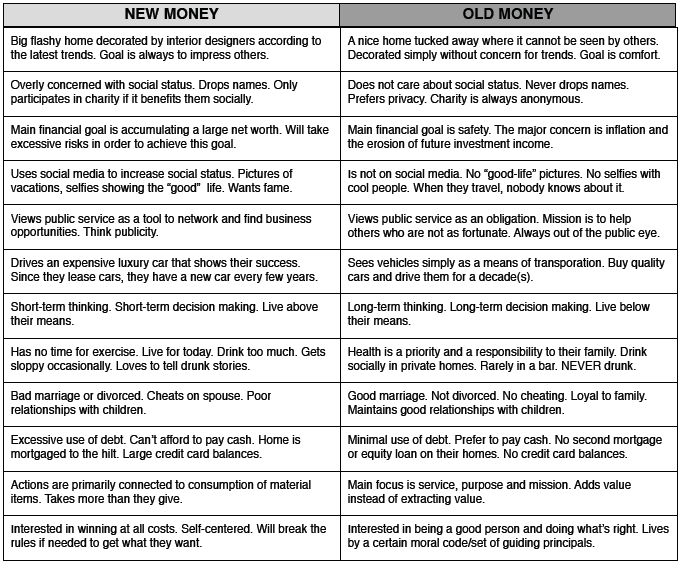For Homecoming two years ago, a large group of my
daughter’s friends met at one of the oldest and most
prestigious country clubs in our area for pictures.
All of
the Moms immediately turned into paparazzi, snapping
dozens of pictures. I didn’t take one picture. 🙂
Kirtland County Club was
designed and built in the 1920s from a large 580-acre
estate by several local OM families. As we
walked in to meet everyone for pictures, the club still
felt like OM to me. My daughter made the
comment that she didn’t really like the place.
I, on the
other hand, love it.
It’s not glitzy or glamorous. It’s simple, elegant and
classy. It’s also quiet, reserved and casts an
overwhelming feeling of self-discipline.
There is something really cool about OM worthy
of study and contemplation.
So what did this Cashflownaire do
to learn more about OM,
you might wonder?
He found a
few books and stuck his nose in
them for several hours.
The reason I had to study OM is because my family is
NOT OM. I’ve also
haven’t had any OM role models
either. And sadly, for a short period of time in my life, I
tried desperately to be New Money (NM).
I wanted the big impressive house. I wanted to
broadcast my success to the world. I wanted publicity
for my businesses. I was trying to be someone that I
wasn’t. I was miserable, stressed out and hated the
public persona that I had created for myself.
It’s hard to admit, but I was the person listed in the NM column in the chart pictured below:

After learning a great deal about how to live well, I
realized that I was so unhappy because deep down I’m
not NM. I’m personally not impressed by NM, and yet this is the person I was trying to be.
Through my reading, I learned that OM isn’t necessarily about money, as we all tend to think it is. It’s more about a certain mindset on what’s important and what’s not important.
OM is not the Vanderbilts, Astors, Du Ponts, or the Rothschild families like we tend to think.
When we think of OM, we think it’s families who have had money for several generations. This may be true, but it isn’t what’s required to live like OM.
Consider the following from the book “The Old Money Book: How to Live Better While Spending Less: Secrets of America’s Upper Class“ by Byron Tully:
“When the general public thinks of wealthy people, they think of them living in big houses, driving expensive cars, wearing fashionable clothes and flashy jewelry…
Old Money response to such behavior: peacock today,
feather duster tomorrow. The priority for Old Money is independence, not display. If you have to get
up in the morning and go to a miserable job in order
to pay for a big house, expensive car and high-end
wardrobe, what’s the point? If
you can get up in the morning
and do whatever you want to do
that day – and every day – that’s
quite a luxury.
Independence makes it easier to discover what it is you really enjoy doing, both regarding a vocation and regarding hobbies and leisure.
Independence is easier to maintain when you live simply and focus on doing and being more than spending and having….
Independence often requires hard work to
acquire it and diligence to preserve it.
That’s why Old Money lives efficiently and quietly. Money not spent is money that can be saved and invested. Old Money is fortunate, and it knows it. It does not squander, but it is not cheap, especially with family and friends. Old Money is an investor, not a consumer.”
If we drill into how OM operates, we may find their life philosophy is similar to our Cashflownaire mindset. The Cashflownaire Membership is OM.
To live with the OM mindset, you must approach life from a different perspective.
This
perspective focuses on education, personal time, service
to others, health, purpose and living a quiet life.
Back to
Tully’s book:
“The philosophy of Old Money is to enjoy life to the
fullest; to learn and grow as a person; to work hard
and excel in a profession that one enjoys and is
passionate about; to preserve and expand one’s
financial resources while using them well; to share a
rich life with friends and family; to explore the world
in order to better understand it, and one’s place in it;
to prepare one’s children for a productive, healthy
and rewarding life of their own; to benefit society
and its less fortunate members through charitable
giving or vocation; to leave a legacy for future
generations.”
OM approaches life with a great deal of self-control.
This self-control is applied to every area of their
lives, including their contribution to the world…
“One’s contributions to family in particular and society
in general through hard work, discipline, discretion, and
charity are much more important than public opinion or
approval. A life built on purpose, infused with poise, filled
with joy, and framed with self-imposed guidelines for
what is and what is not permissible, is preferable. Being
inner-directed and seeking approval oneself rather than
others leads to greater fulfillment.”
The bottom line is that we can learn to live well simply by learning to think & act like OM.